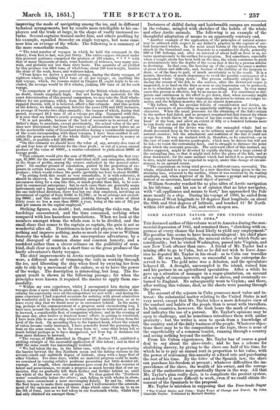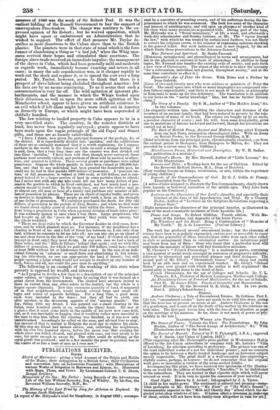JOHN GLA.NTILLE TAYLOR ON THE UNITED STATES AND CUBA. * THE
deceased author of this volume went to America during the oom- mercial depression of 1841, and remained there, " clutching with ea- gerness at every chance the least likely to yield any employment." His peculiar line seems to have been mineralogical : his chief place of sojourn was Pennsylvania, the mineral riches of which State are considerable; but he visited Washington, passed into Virginia, and saw New York oftener than once. A. friend of Mr. Taylor had a mining offer to go to Cuba, but as he did not wish to leave Ame- rica he deputed Mr. Taylor in his stead : so to Cuba our traveller went. He was not, however, so successful as his enterprise de- served to be. The gold mine was a delusion, and the speculators behaved ill. A drought, unexampled in the island, ruined him and his partner in an agricultural speculation. After a while he gave up a situation of manager in a sugar-plantation, on account of a scruple of conscience with regard to slaves, and eventually re- turned to England. He subsequently went to Ceylon ; and there, after writing this volume, died, as the sheets were passing through the press.
The account of the sojourn in Cuba possesses most value and in- terest : the substantial matter relating to the United States is not very novel, except that Mr. Taylor takes a more defensive view of the conduct and habits of the people than is usual with travellers. In both countries, however, the book bears the mark of residence, and indicates the use of a pursuit. Mr. Taylor's opinions may be open to challenge, and he sometimes introduces them with undue prolixity ; but the writer is seen to speak from a knowledge of the country and of the daily business of the people. Whatever objec- tions there may be to the composition or the logic, there is none of the superficiahty of a common tourist, running through a country and seeing nothing beyond the surface. From his Cuban experiences, Mr. Taylor has of course a good deal to say about the slave-trade; and he has a scheme for abolishing slavery, by giving to the slave one half of his time, for i
which he is to pay an annual rent in proportion to his value, with the power of redeeming this annuity at a fixed rate and purchasing the rest of his time. By the letter of the Spanish law, the slave can purchase his freedom at present ; whatever difficulties the im- providence of the slave, the wealth of his owner, and the corrup- tion of the authorities may practically throw in the way. All that Mr. Taylor's plan really does, is to complicate the present system, and so render it more difficult to work, even if we could obtain the consent of the Spaniards to the proposal.
Mr. Taylor is mistaken in supposing that the Free-trade Sugar
• The United States and Cuba: Eight Years of Change and Travel. By John Glanville Taylor. Published by Richard Bentley.
measure of 1846 was the work of Sir Robert Peel. It was the earliest bidding of the Russell Government to buy the support of =scrupulous Free-traders. The change was contrary to the ex- pressed opinion of Sir Robert ; but he waived opposition, which might have upset or embarrassed an Administration that he wished to support. The effect of that measure Mr. Taylor de- scribes as more disastrous to the Cuban slave than to the British planter. The planters were in that state of mind which is the fore- runner of abandoning a thing as " a bad job," when the Whig mea- sures revived their hopes and stimulated their exertions. The foreign slave-trade received an immediate impulse; the management of the slaves in Cuba, which had been generally mild and moderate as regards work, immediately became exacting and severe in all cases; in many the sole consideration was, is it cheaper rapidly to work out the stock and replace it, or to spread the cost over a long period. Mr. Taylor, however, seems to think that there is a prospect of slave-labour being abolished throughout America : but data are by no means convincing. To us it seems that such a consummation is very far off. The wild agitation of ignorant phi- lanthropists, and the manner in which the Whigs traded upon their delusions, as well as upon the more selfish agitation of the Manchester school, appear to have given an artificial existence to an evil which if left alone might have worn itself out in America as formerly in Europe, or which might have been superseded if skilfully handled.
The law relating to landed property-in Cuba appears to be in a very unsettled state. The country, in the remoter districts at least, has never been regularly surveyed ; grants appear to have- been made upon the vague principle of the old Papal and Stuart gifts, and these are as loosely subdivided.
" I have, I think, now given the principal features of the geology, &c. of the district. It is superficially divided into particles,' and the subdivisions of these are so curiously managed that it is worth explaining, for I suppose nowhere in the world is the tenure of lands on such a strange footing. It is said, then, that a very long time ago the country was first divided out into these oartidos.' I have been told that, though never surveyed, these pertiona were severally valued, and portions of them sold by auction or other- wise, and granted to settlers. These several grants or purchases were called ones. Suppose the whole partido to have been valued at 100,000 dol- lars and that to any individual had been granted the hundredth part, he could say he had in that partido 1000 dollars of possession. A 'posecion en- ters,' or full possession, is valued at 1000 reale, or 125 dollars, and is sup- posed indeed to be a larger portion of land in some partidos than in others; bat I never met with any one who could. tell me how many dollars of pos- stission the partido in which he lived contained, nor how much land a pos- session meant to stand for. In the mean time, any one who wishes may go to almost any old man or head of a family and purchase any number of dol- lars of possession he pleases. These are an objectof regular traffic, and given as dowers to daughters. Many people go and work a farm on the strength of one dollar of possession. We ourselves purchased the deeds, for fifty odd dollars, of possession in the partido of Fray Benito ; and when we first went we found about eighty acres of cleared land within the fence. Preserve me from being a proprietor in Cubit when a general division of lands takes place! It was seriously-spoken of once when I was there. Large proprietors, who had bought up all the pesos de posecion' they could, were uneasy, but the others trembled.
" There are local rules by which the Governor decides in civil cases, how- ever, and by which planters must go. For instance, if my neighbour has a clearing in front of me arida belt of forest lies between us, I can only clear half, without he consents to let me take all: nor can any one go on ahead of me and clear forest in the line of the run' of my land ; if cleared all round. (except in front only) they must divide. In our own case we had a back of three miles, and the Silk de Gibara ' behind that again ; and we with fifty dollars of possession, for which we paid only 250 dollars, could have cleared at least 2000 without let or hinderance from a soul. In the ease of an indi- vidual forming an estancia' or small farm and abandoning it, but retain- ing his title-deeds, no one can appropriate the land if fenced ; but still people opening a large estate would not scruple to swallow up any number of such, fences and all, nor could the poor man do anything."
i
' The following is an example of the working of this state when poverty is opposed by wealth and interest. "As I propose to devote a few lines to a description of one of the principal sugar estates, or ingenios,' I may begin by saying that it was formed on a grant direct from the Government. The cleared land amounts indeed to more in extent than any other estate in the district, but the whole is a league square (Spanish). Now this enormous quantity of Land, if measured off in that neighbourhood, would include several large and small vil- lages and scores of separate holdings. For a long time, a good many such were • included in the fence; but they all had to yield, one after another, to the devouring appetite of the ingeano grande.' One day, riding with my friend, I was pointed out a small clearing in the forest, some hundred yards or so, outside the (then) fence. He saw at a glance that it must come fairly in the middle of his next new cane-field, and, as it was inevitably to happen, that it would be rather more merciful to the man to stop hint before the clearing was finished, as it was now only underbrashed. Accordingly he called on the man, and advised him to stop ; but instead of that he started to Holguin the next day to enforce his claim. Of this step my friend had instant advice, and, collecting his neighbours, With his own two hundred slaves, before the moon rose that evening the whole piece was felled, cleared, and planted with cane, not very nicely to be sure, but quite enough to swear by. The other could do nothing, as the royal grant was produced ; and in a few months the piece in question was in the centre of as fine a tract of cane as I ever saw."



























 Previous page
Previous page